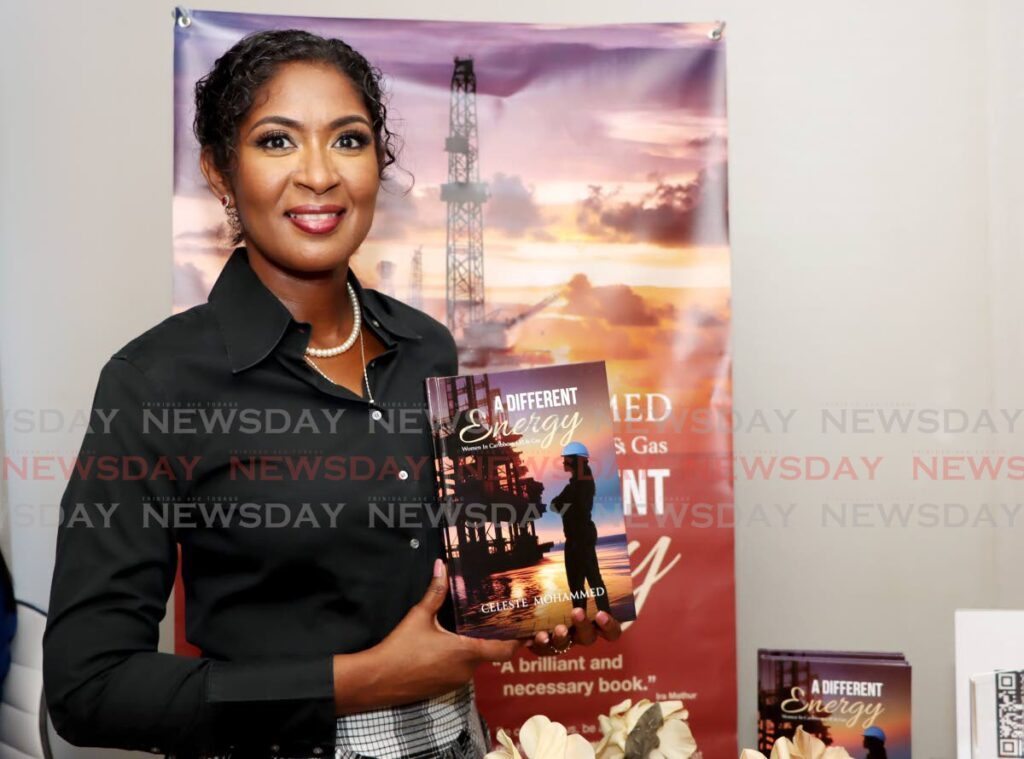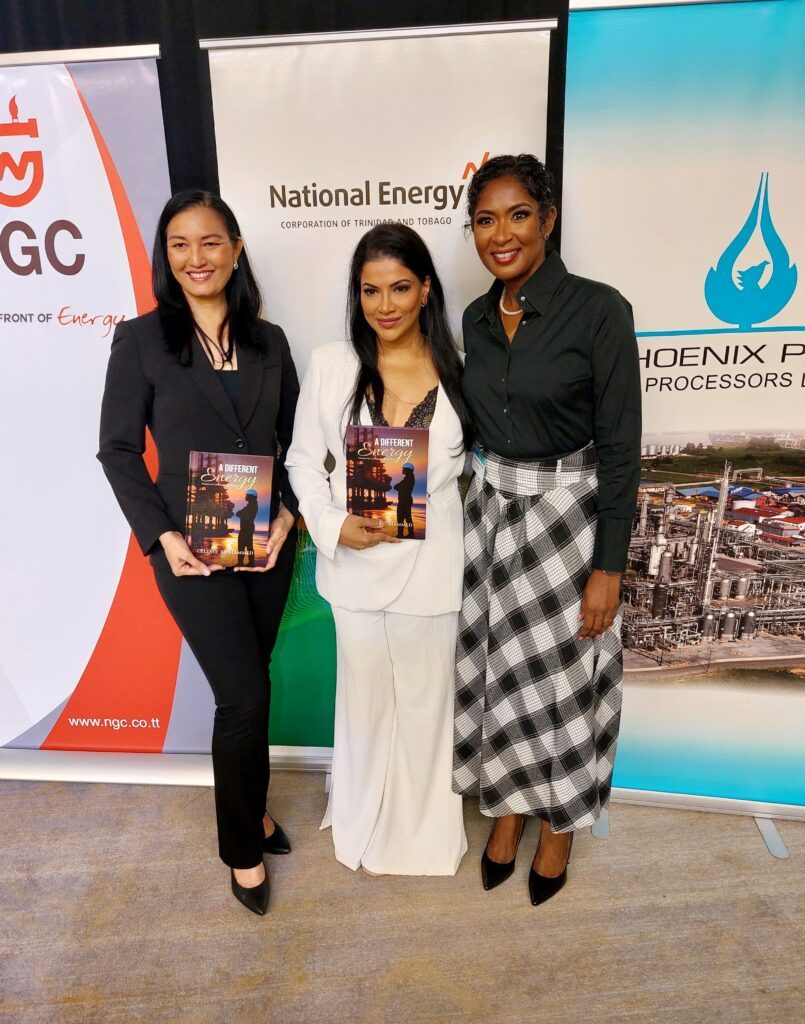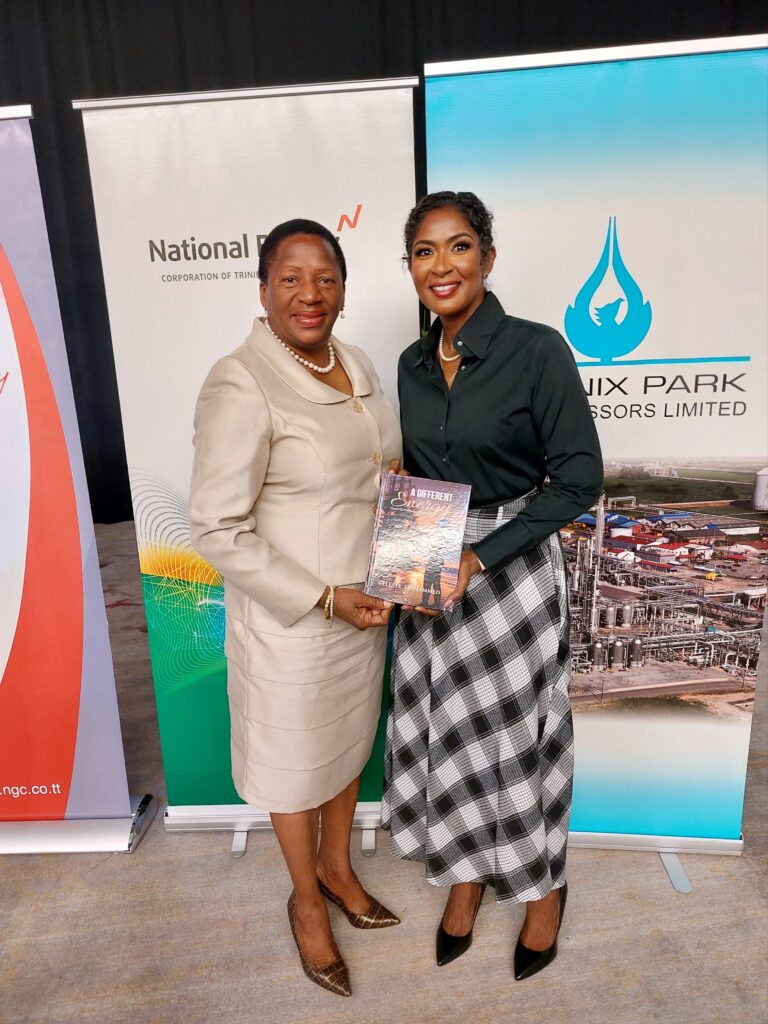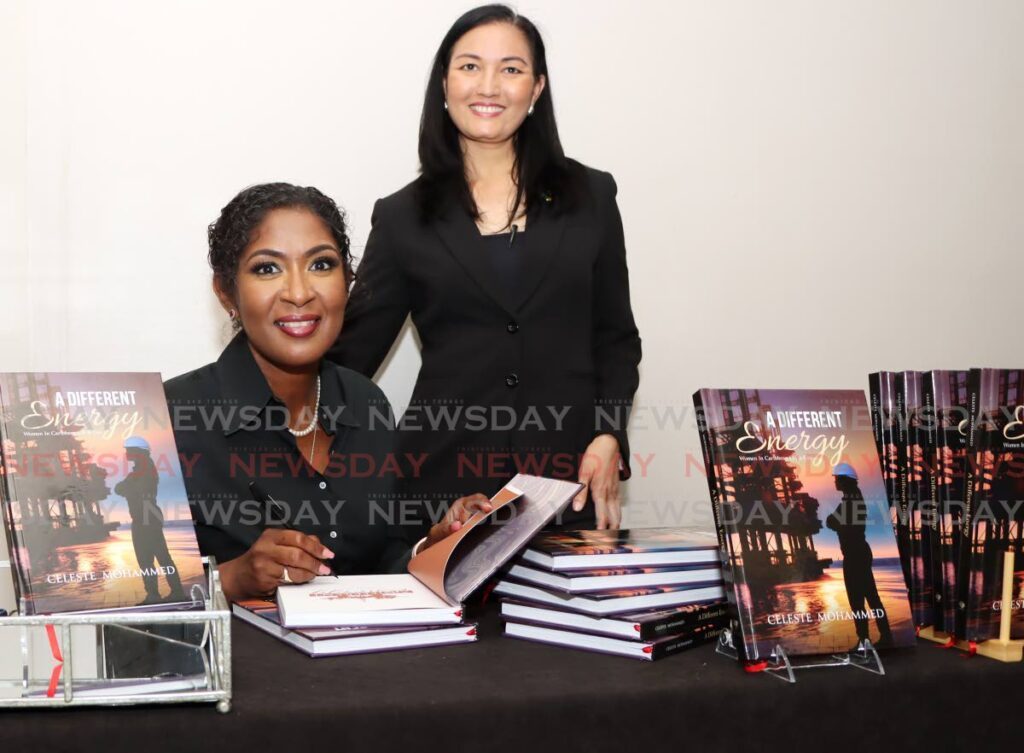Award-winning author: Women in Caribbean Oil and Gas 'not a male-bashing encyclopaedia'

Recognising the need to tell the untold stories of women who work in the energy field, Celeste Mohammed’s non-fiction debut, A Different Energy, Women In Caribbean Oil and Gas, provides an intimate look into the compelling stories of eight women in the oil and gas industry.
Mohammed, a lawyer turned award-winning author, and publisher Deborah Benjamin launched the book at the TT Energy Conference at the Hyatt Regency in Port of Spain on January 23.
In a panel discussion moderated by former CNC3 news anchor Shelly Dass, Mohammed said contrary to what people may think, the book is not a “male-bashing encyclopaedia.”

- Photo by Zainab Kamara
Instead, she said, it encapsulates her natural love for storytelling, memoir and literature to humanise what she described as the systemic issues women in the energy industry endure.
“I would say that the book is about trying to address what I would call the perception gap that still exists between how women actually experience the industry and how they are presumed to experience it by persons both in and outside the industry.”
Planning and Development Minister Pennelope Beckles endorsed it, saying, “I am happy to recommend this book to a broad audience of academics, gender and management studies, researchers and persons in and around the oil and gas sector.”

In an interview with Business Day, the award-winning author, whose first book, Pleasantview, won a trifecta of awards in 2022 – the OCM Bocas Prize for Caribbean Literature, the CLMP Firecracker Literary Award for fiction and the Caribbean Readers Award, also for fiction – said when Benjamin contacted her that year about writing the book, she immediately accepted the challenge, but did not know how to go about it.
“It took me six months to come up with a sort of proposal, go back to her and say, 'This is the book I would like to write,' and when she said yes, it just flowed from there.”
Mohammed, who is mother to a little girl, said while she wanted to write the book as a favour to herself as a professional woman, she was also motivated to do so for her daughter .
“I realised that the natural resources of this country belong equally to my little daughter as to the little boys in her class. She should be able to grow up and participate in the industry as a worker or contractor on the same terms, no less favourable than guys.
“I want that for her. So if this book can continue that conversation in a way that is effective, then I am happy to do it.”
Benjamin, the managing director of ASCO Logistics Ltd – a company that supports exploration and production activities regionally, with major clients in the hydrocarbon industry like Shell – said she commissioned the publishing of the book through her company Words Matter Communications as a personal passion project, after reflecting on the obstacles she had to overcome as a female leader in the energy industry.
“When I recognised that a lot of other prominent women in the industry – those that paved the way and those that were on the same journey and timeline that I was – were facing the same challenges, it helped validate me that I wasn’t a crazy person and that we were all facing the same challenges.
“That was the impetus to say, 'We need to speak out about this. We need to be aware of what we are facing, because the energy industry is always so forward-thinking and always on continuous improvement…so why wouldn’t the industry want to make an advancement and solve some of these problems for us?' Somebody needed to speak out about it.”
Mohammed said the eight women she spoke to across three jurisdictions – TT, Suriname and Guyana – fell into two categories in oil and gas. There were the "technical" women, who would tend to be in the field and may work offshore, whose experience, she said, was “really quite challenging,” dealing almost exclusively with men and the very physical and rigorous nature of that kind of work.
Then there were the boardroom “suits and heels" women, trying to navigate their way in the boardroom and the inevitable fight to get their voices heard in a space where, again, they were most likely in the minority.
Without giving away too much, Mohammed revealed Arlene Chow is one of the women featured in the book.
With over four decades of service to the global energy industry, Mohammed said Chow was the perfect candidate to give her perspective on the experiences of women leaders in the industry.
Chow retired last year from Heritage Petroleum Company Ltd after four years as its CEO.
“When I spoke to her, she was still onboard at Heritage and was about to transition out. I felt that she would have a perspective and a platform…Her career spans the gamut, both here and abroad. And she, being someone who was now leaving the industry, would be able to say and speak candidly in ways that perhaps persons still in the industry might not.
“I enjoyed talking to Arlene. Arlene was honest, she was candid. At times she brought me to tears. But always she was very encouraging and her takeaway is to recommend the industry.”
Chow told Business Day when she was first contacted by Mohammed, she was hesitant to tell her story. She was encouraged to do so by her family and admitted she cried after reading the first draft.
"I really didn’t want to do this story because it was so personal. But I spoke to my family and they encouraged me to do this. When I read the draft the first time. I cried. It was like a catharsis. I was reliving some of the trauma. And then I really didn’t want to do it. But I had reached this far. And there was no turning back."
Chow encouraged women to persist despite the challenges they may encounter.
"I had a great and an exciting career despite all the challenges. And I think the oil and gas industry has changed significantly from when I started. the journey in any career will have challenges but with determination, and persistence you can be successful and pave the way for future generations of women."

Irrespective of their position in the energy industry, Mohammed said there were common themes, as the women all spoke about similar gendered issues they had to deal with – a fact that was unknown to her interviewees.
Mohammed felt a sense of camaraderie with the women, having her own experience as a lawyer working all over the world and, like the women in her book, being the only one in the room.
“When I started to talk to these women and hear their stories, instantly there was a connection. I just started to write from that place of connecting with them.”
Mohammed said the ergonomics of the energy industry was one of the surprising challenges that another interviewee, Satira Maharaj, illuminated for her. In chapter five, Maharaj, an industrial engineer who also teaches gender studies at UWI St Augustine, points out the way the energy industry’s working conditions favour men.
“The way ladders are built, the way coveralls are built. I mean, women have to use the bathroom differently. All those little things make a difference," Mohammed said.
“If you’re not able to do your work safely, then you’re not able to do your work. Then people have an excuse to say, ‘Oh no, I won’t send you.’
"So all of those things matter. They add up.”
Also commenting on the ergonomics of the industry, Benjamin said she doesn’t necessarily think there is a deliberate attempt by men to exclude women or not deal with the problems. She said sometimes the solutions to the problems simply do not occur, which she believes further affirms the need for the book to spark conversations about those issues and prompt people to want to enact change.
Maharaj, who is also an industrial engineering PhD student focusing on gender in the field of engineering, delved deeper into the industry's macro and micro-ergonomics, saying, "In the industry, equipment, tools and even PPE (Personal Protective Equipment) is designed and stocked for the physical norm – men. Unfortunately, sometimes that means people who do not fit the norm are excluded.
"For instance, climbing harnesses are usually designed (and purchased) to fit people over 125 pounds. If someone weighing less than that (usually a woman) needs to climb to inspect or measure something, she cannot safely do so without a harness that fits properly."
Ladders are a necessity to carry out work in the industry which Maharaj said requires more upper body strength than stairs. She said the industrial environment is built with men's bodies in mind.
"We can think about the differences between men’s bodies and women’s bodies, and how the industrial environment is often built with men’s bodies in mind. Women even have difficulty getting coveralls that fit the chest area properly. Sometimes we have to use bigger sizes and get the legs shortened. But the torso length and crotch area do not fit well.
"This can even be a hazard if a woman is trying to navigate an industrial area with tall columns, pipes and hot equipment. Badly fitting coveralls can snag and get caught."
In addition to speaking to the women, Mohammed said she also did her own in-depth research and found some of the issues the women highlighted were not restricted to the region, but were global, such as the retention and promotion of women. Mohammed said recruitment retention is necessary.
“The research shows that there is not so much a recruitment problem any more: there are women willing to come into the industry, and they have the relevant qualifications.
"But there is a retention problem and a promotion problem. We need to get women into the industry at entry level and we need to keep them. You have women coming in, in droves, but not staying. because the industry still has not found a way to help women balance being a wife, a mother, a caregiver and her job. So that’s still something that needs to be worked on.
"And in terms of promotion up the ladder, very few at the tip-top are changing.”
Mohammed said through her conversations, she learnt the women experienced differences in the way they were assessed as compared to their male counterparts.
“One of the things that a few of the women said was the way women are assessed for promotion, sometimes it is a bit different than how men are assessed. Because a woman, for example, might be accused of being aggressive, whereas a man would be told he is assertive. So there is much still to be ironed out.”
Mohammed said all the women she interviewed had a high level of grit. Other traits she observed were their passion for working and continuous learning.
“All of these women, every single one, loved learning. They all said the same thing, without knowing that the others were saying it: ‘I like to work.’ So these are women who don’t back down from a challenge.
“Surprisingly…every single one of them talked about the value of forgiveness.”
Mohammed said she wanted the book to speak to women at any level.
“I wanted to show a sort of continuum. So what Arlene talks about, we have a very young engineer coming 20, 30 years later, saying the same things, not knowing what Arlene said.”
Mohammed said from a corporate and industry perspective, she feels the book does two things well.
“It packages an important but thorny issue in a very convenient and readable way. And also, by centring the lived experience of eight women across three countries, it really does give women's voices in the industry a pride of place.”
Benjamin said the book is particularly focused on Caribbean women.
“I think we are strong. Our experience as Caribbean women, our heritage in these islands, gives us that grit, gives us that secret source to be resilient and do what we need to do to be successful. These are the voices that you will read about."
Mohammed gave reasons why she believes people should buy the book.
“If you are a woman who has ever worked in an environment where you were less than welcome, then you need to read this book, because, like me, you would come away from these women’s stories feeling less lonely and feel less like, ‘Oh my gosh, I wasn’t crazy.’
“If you are a man seeking to be enlightened and to be a better supporter, cheerleader, boss for the women in your life, I think this book would help you, would help sort of bridge that perception gap.”
She also encouraged companies in the energy industry to make the book available to employees, as she believes this will send a “resounding message” as to how those companies value women.
The book is available online through Amazon and Barnes & Noble, and locally at Paper Based bookshop in St Clair. It is also available via the websites wordsmattercommunications.org and celestemohammedwriter.com.


Comments
"Award-winning author: Women in Caribbean Oil and Gas ‘not a male-bashing encyclopaedia’"